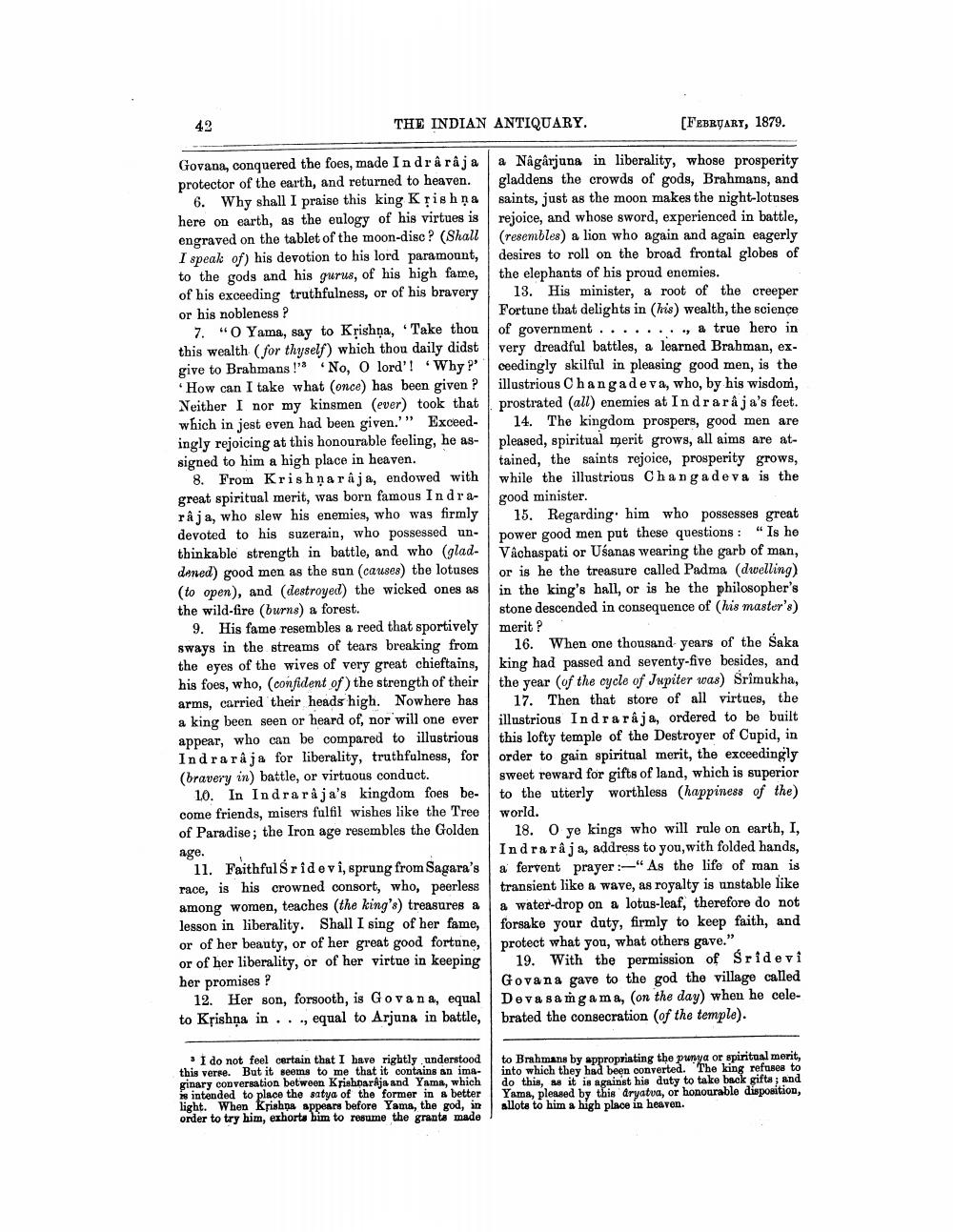________________
42
THE INDIAN ANTIQUARY.
(FEBRYARY, 1879.
Govana, conquered the foes, made Indrâ râja a Nagarjuna in liberality, whose prosperity protector of the earth, and returned to heaven. gladdens the crowds of gods, Brahmans, and
6. Why shall I praise this king Krishna saints, just as the moon makes the night-lotuses here on earth, as the eulogy of his virtues is rejoice, and whose sword, experienced in battle, engraved on the tablet of the moon-disc ? (Shall (resembles) a lion who again and again eagerly I speal of) his devotion to his lord paramount, desires to roll on the broad frontal globes of to the gods and his gurus, of his high fame, the elephants of his proud enemies. of his exceeding truthfulness, or of his bravery 13. His minister, a root of the creeper or his nobleness ?
Fortune that delights in (his) wealth, the science 7. “O Yama, say to Krishna, Take thou of government ........, a true hero in this wealth (for thyself) which thou daily didst very dreadful battles, a learned Brahman, exgive to Brahmans!' 'No, O lord'! Why?' ceedingly skilful in pleasing good men, is the * How can I take what (once) has been given ? illustrious Changadeva, who, by his wisdom, Neither I nor my kinsmen (ever) took that prostrated (all) enemies at Indraraja's feet. which in jest even had been given.'" Exceed- 14. The kingdom prospers, good men are ingly rejoicing at this honourable feeling, he as- pleased, spiritual merit grows, all aims are atsigned to him a high place in heaven.
tained, the saints rejoice, prosperity grows, 8. From Krishnaraja, endowed with while the illustrious Chang adeva is the great spiritual merit, was born famous Indra- good minister. råja, who slew his enemies, who was firmly 15. Regarding him who possesses great devoted to his suzerain, who possessed un- power good men put these questions : "Is he thinkable strength in battle, and who (glad- Vachaspati or Uśanas wearing the garb of man, dened) good men as the sun (causes) the lotuses
or is he the treasure called Padma (dwelling) (to open), and (destroyed) the wicked ones as in the king's hall, or is he the philosopher's the wild-fire (burns) a forest.
stone descended in consequence of his master's) 9. His fame resembles a reed that sportively merit? sways in the streams of tears breaking from 16. When one thousand years of the Saka the eyes of the wives of very great chieftains, king had passed and seventy-five besides, and his foes, who, (confident of the strength of their the year of the cycle of Jupiter was) Srimukha, arms, carried their heads high. Nowhere has 17. Then that store of all virtues, the a king been seen or heard of, nor will one ever illustrious Indra råja, ordered to be built appear, who can be compared to illustrious this lofty temple of the Destroyer of Cupid, in Indrarâja for liberality, truthfulness, for order to gain spiritual merit, the exceedingly (bravery in battle, or virtuous conduct.
sweet reward for gifts of land, which is superior 10. In Indrarå ja's kingdom foes be- to the utterly worthless (happiness of the) come friends, misers fulfil wishes like the Tree world. of Paradise; the Iron age resembles the Golden 18. O ye kings who will rule on earth, I, age.
Indrarâ j a, address to you, with folded hands, 11. Faithful sridevi, sprung from Sagara's a fervent prayer :-"As the life of man is race, is his crowned consort, who, peerless transient like a wave, as royalty is unstable like among women, teaches (the king's) treasures a a water-drop on a lotus-leaf, therefore do not lesson in liberality. Shall I sing of her fame, forsake your duty, firmly to keep faith, and or of her beauty, or of her great good fortune, protect what you, what others gave." or of her liberality, or of her virtue in keeping 19. With the permission of Sridevi her promises ?
Govana gave to the god the village called 12. Her son, forsooth, is Govana, equal | Deva sa mga ma, (on the day) when he celeto Krishna in ..., equal to Arjuna in battle, brated the consecration (of the temple).
I do not feel certain that I have rightly understood this verse. But it seems to me that it contains an imakinary conversation between Krishnaraja and Yama, which is intended to place the satya of the former in a better light. When Krishna appears before Yama, the god, in order to try him, exhorta bim to resume the grants made
to Brahmane by appropriating the punya or spiritual merit, into which they had been converted. The king refuses to
do this, it is against his duty to take back gifta; and | Yami, pleased by this aryatua, or honourable disposition,
sllota to him a high place in heaven.




